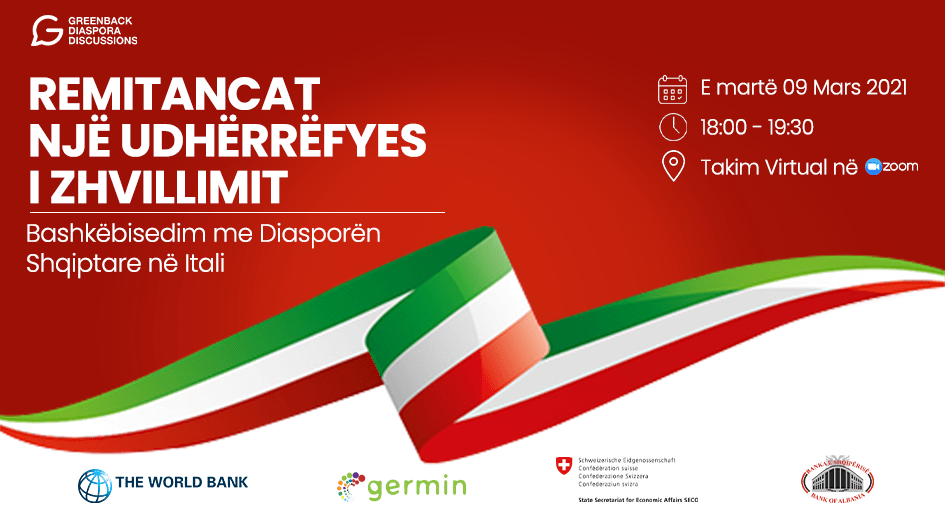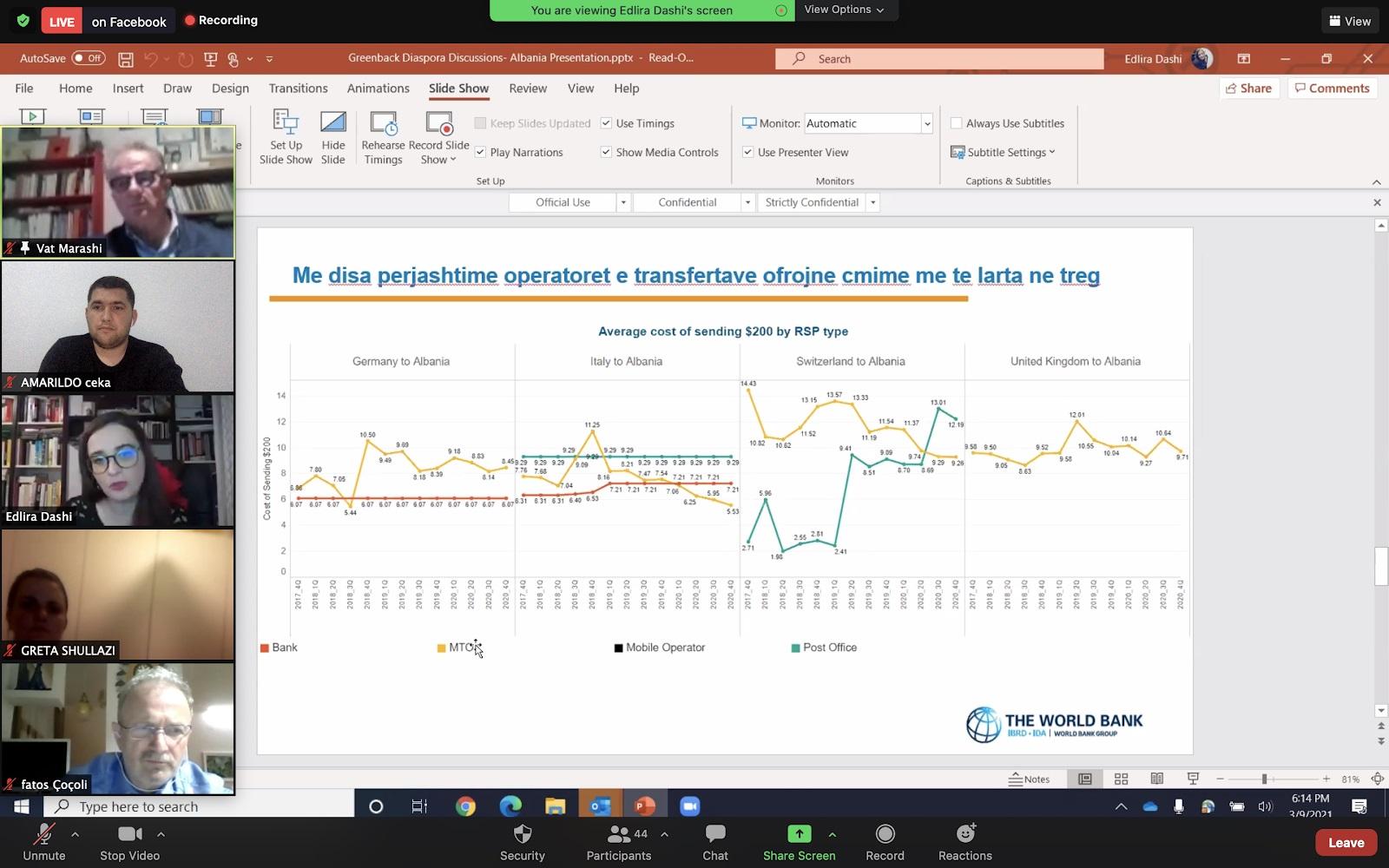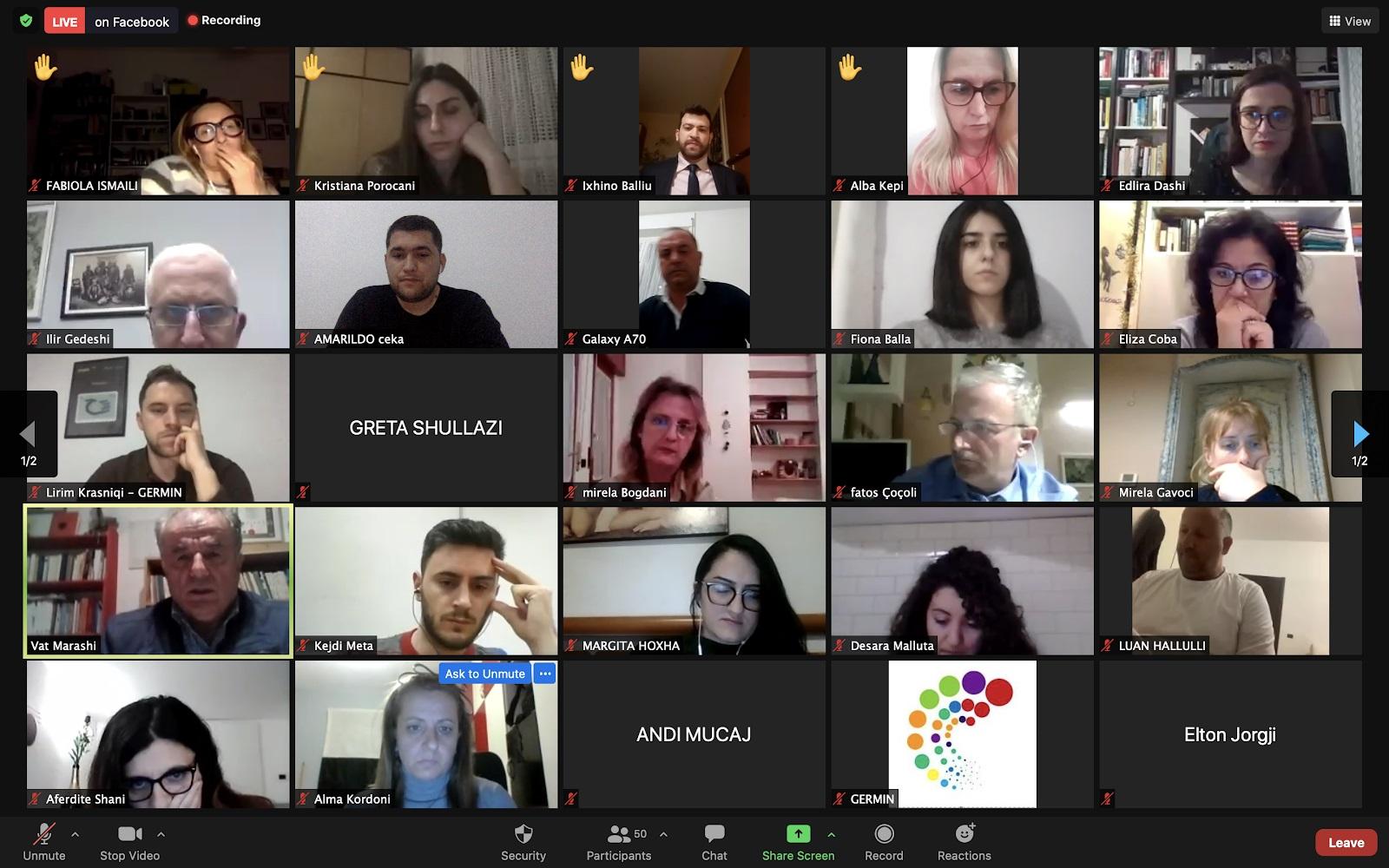
GERMIN in cooperation with the World Bank Albania organized the virtual meeting: Remittances – a footprint for development. This event brought together 56 participants in ZOOM and over 30 on Facebook Live from the Albanian members of the diaspora in Italy and the main stakeholders related to remittances to Albania.
Edlira Dashi: As it is known, 1.2 million Albanians live outside the Republic of Albania and every year they send $ 1.4 billion in remittances, or 10% of the country’s GDP. Despite the economic problems due to the pandemic, remittances do not seem to have decreased during this year and continue to be at a very high and significant level for Albania. This large influx is oftentimes higher than foreign direct investment and often exceeds official assistance coming from various partner countries. Thus, remittances are a safe and stable source for financing Albanian families. On average, remittances make up about ⅓ of the budget of Albanian households that benefit from them. An important part of these families have remittances as a key source of their livelihood. But no matter how important remittances are, they still remain a costly source of funding. To send a sum of $ 200 to Albania, a diaspora Albanian spends about $ 16. Italy is one of the main sources of remittances for Albania and is one of the countries with the lowest cost. It should also be borne in mind that a significant part of these remittances is channeled to unofficial sources. Electronic remittances are not usable in Albania and remittances are mainly made through banks and money transfer companies, at a high cost.

Ilir Gëdeshi: Almost 57% of the population of the Republic of Albania is abroad. This population is mainly concentrated in Greece and Italy, but in the last 10 years this movement is being channeled more towards Germany, England, USA, and Canada. So, we have a shift of Albanian emigration flows, moving from countries with lower incomes, to countries with higher incomes. Consequently, this will be reflected in the perspective of remittances as well. Studies on remittances date back to the late 1990s, reflecting different patterns of migration. In the 90’s mostly men emigrated who settled in the host country illegally. After a few years when they were provided with the relevant documents they had the opportunity to withdraw the family as well. So an immigrant in the 90’s sent remittances to the whole family. In the early 2000s meanwhile this pattern changed as those immigrants withdrew their family, i.e. wife and children with family reunification, and thus they sent fewer remittances because they were already sending only to parents. With the onset of the economic crisis, remittances began to fall due to the crisis and due to declining emigration flows. This trend began to change when the world, mainly Greece and Italy began to emerge from the crisis.However now some new trends are noticed. Emigration has begun to flow to Germany and other Western European countries and consequently having higher incomes can send more remittances. Specifically, a study conducted in the years 2010-2011 found that remittances sent to Albania were lower compared to Kosovo, as Albanian Albanians were settled mainly in Greece and Italy, while Kosovo Albanians were settled in places such as Germany, Nordic countries or England. What is worth mentioning is that it is noticed that both the Albanians of Albania and the Albanians of Kosovo have their savings income in the place where they live. So if they send a remittance unit, they save 5.5 units in the country of emigration. So this is a potential amount which in favorable economic and social conditions in Albania can be sent in the form of remittances. It is also important to mention how remittances are used. All surveys conducted since the 1990s show that remittances are little used for investment and most of them are used for consumption. Even today this thesis prevails, and most remittances are used for consumption. Emigration today in Albania continues to be quite high and mainly educated young people are leaving for more western countries. This can be translated as an opportunity for remittances to be even higher in the future if there are suitable conditions for their investment in Albania. This would be a qualitative increase in remittances as a good part of them would be invested in the country’s economy. The main ways of sending remittances, in the 90’s informal routes prevailed, in the 2000s formal routes began to take precedence, through money transfer agencies and banks, but the cost of money transfer through these agencies continues to be high and this negative influence.
Vat Marashi: What is important is to create a climate of cooperation on how to conceive an increase in the amount of immigration investments. This is because as long as remittances will go only for consumption, of course this does not create any major increase for the Albanian market. Investments give another impact, but here we must take into account some other elements such as trust, laws, facilities that are created. We have to be confident but we still have to work hard. Interestingly, despite the situations that have affected the economy, remittances have not had any significant decline this crisis year. It would be important to strengthen and regulate these visions or laws of communication, investment security. Immigrant groups have visions for the future and are committed to working for them.

Fatos Cocoli, an expert on economic issues at the Ministry of Diaspora, stated three main needs. First, encourage and increase the transfer of money from the diaspora through official channels. Second, the orientation regarding spending this money more effectively and finally, to be able to attract new diaspora savings through banking channels or domestic investments.
The discussion was then focused on the audience which was engaged throughout the meeting on the chat. Questions from the audience were answered from the panelists and a well rounded discussion occurred.
GERMIN në bashkëpunim me Bankën Botërore po organizon një seri eventesh me Diasporën Shqiptare në të gjithë botën dhe ekspertë të sektorit financiar në Shqipëri për të diskutuar sfidat dhe mundësitë në lidhje me remitancat, si një katalizator i rëndësishëm i zhvillimit ekonomik.
The series is developed in the context of Project Greenback, the financial education component of the Remittances and Payments Program (RPP), funded by the Swiss Secretariat of Economic Affairs (SECO) and implemented by the World Bank in partnership with the Bank of Albania.